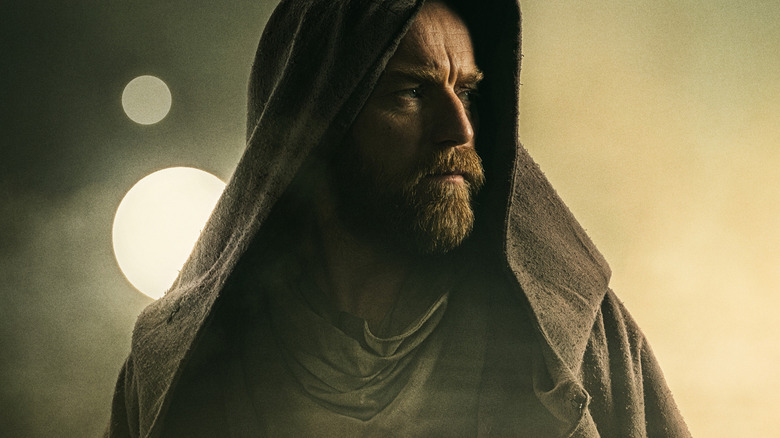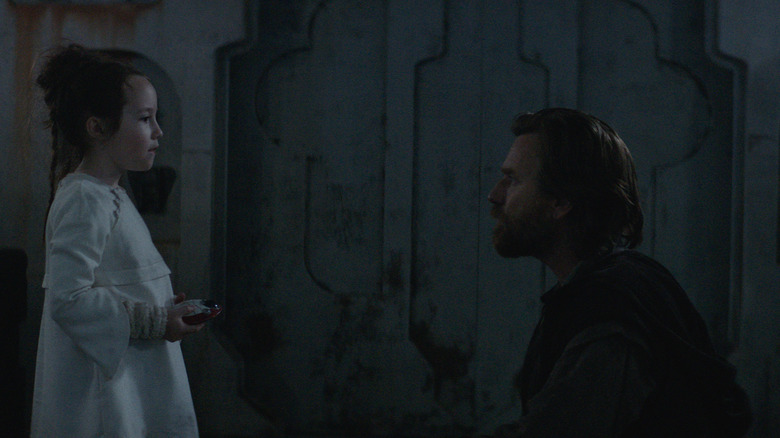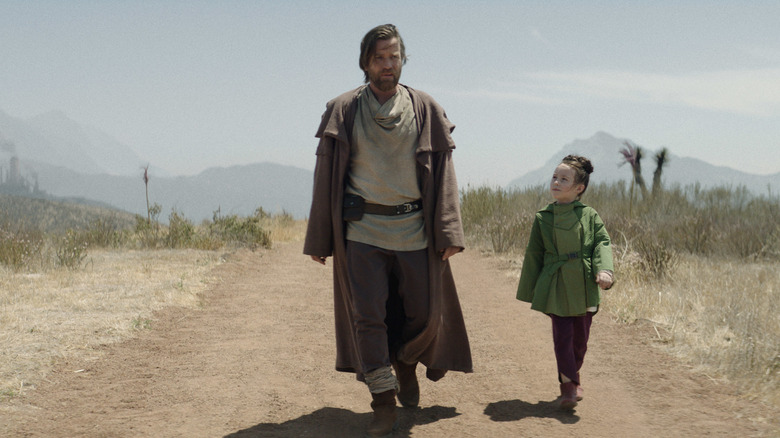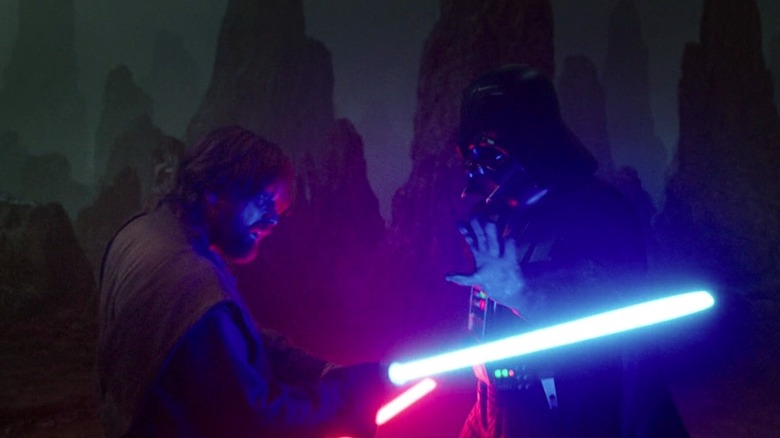Obi-Wan Kenobi Was Originally Written As A Movie Trilogy, Not A TV Show
Stop me if you've heard this one before: a major streamer comes out with a new franchise-based series that noticeably stretches out several hours worth of story into multiple episodes, even though it probably would've been better served as a feature-length movie. More often than not, all sorts of coldblooded business decisions factor into why and how we end up with this turn of events. Unfortunately for the writers involved, money — not the needs of the narrative — tends to rule the day.
As with many modern "Star Wars" productions these days, the overall reaction to "Obi-Wan Kenobi" would have to be considered somewhat mixed. Depending on your point of view (see what I did there?), either it lived up to all the enormous expectations built up over the better part of two decades, or it never quite managed to avoid all those prequel-based pitfalls, falling a little flat in the process. For those of us with a somewhat less-than-favorable reaction to the highly-anticipated series overall, well, perhaps we have an even better idea of why that came to be.
We knew from various rumors and reporting in years past that this project initially started out as a movie under director Stephen Daldry (much like the early plans for Boba Fett, in fact). What we didn't know, however, was the full extent of that original idea ... until now.
We make plans and the Maker laughs
Perhaps the most important part of running a major film studio these days involves the ability to improvise and adapt at a moment's notice. Kathleen Kennedy has overseen this new immensely successful era of "Star Wars" media, though that's not to say there haven't been any self-inflicted missteps along the way. The arrival of Disney+ streaming opened up a whole new avenue of storytelling, but "The Book of Boba Fett" ultimately came and went with no real impact and, as /Film's Ryan Scott astutely pointed out, "Obi-Wan Kenobi" probably should have just been released as a movie.
We're starting to receive a better picture of how an "Obi-Wan Kenobi" movie could've originally unfolded. In an interview with The Direct, series writer Stuart Beattie spilled the details on how he originally conceived this project as a full-blown trilogy. As a result of his work on writing the script for the first movie, he received writing credit on the "Obi-Wan Kenobi" series once they took his script and rejiggered it into serialized storytelling. But otherwise, he didn't have anything to do with the series overall. As he put it:
"Right, so not at all, none. I wrote the film that they based the show on. So, yeah. I spent like a year, year-and-a-half working on it. And then, when the decision was made not to make any more spin-off films after 'Solo' came out, I left the project and went on to other things. Joby [Harold] came on and took my scripts and turned it from two hours into six. So, I did not work with them at all, I just got credit for the episodes because it was all my stuff."
Paths not traveled
A long time ago, "Solo: A Star Wars Story" was meant to jump off the foundation laid by "Rogue One" and help usher in an ambitious era of spin-offs taking place in between the sequel trilogy. The infamously troubled production and the very minimal breathing room between the release of the brilliant "The Last Jedi" and "Solo" teamed up to sink the film at the box office, putting an inauspicious end to the very existence of any more "A Star Wars Story" movies. The reverberations of that disappointment are still being felt to this day, as Beattie alludes to.
He went on to detail exactly how he would've structured that trilogy:
"So when I pitched my Obi-Wan story to Lucasfilm, I said, 'There's actually three stories here. Because there's three different evolutions that the character has to make in order to go from Obi-Wan to Ben.' And the first one was the first movie, which was the show, which was, 'Surrender to the will of the Force. Transport your will, surrender your will. Leave the kid [Luke Skywalker] alone.' So then, the second [movie] was thinking about where Kenobi ends up. And one of the most powerful and probably the most powerful moment in all of Obi-Wan's story is that moment where he sacrifices himself in 'A New Hope.' Great moment, you know, makes you cry. But, if you stop and think about it, it's a pretty sudden thing, to just kind of go be fighting a guy, to see Luke and go, 'I'm gonna die.' You know, that to me, that required forethought. That required pre-acceptance that this was going to happen."
The second movie would've featured Obi-Wan "[coming] to terms with his own mortality," which Beattie expressed he'd love to write for a potential second season.
'I wish they'd been able to make my movies'
So how far along did this trilogy get to becoming a reality? According to Beattie, Obi-Wan himself, Ewan McGregor, was "on board" along with "everyone" at Lucasfilm. Alas, that simply wasn't meant to be when the underperformance of "Solo" forced the studio to go back to the drawing board and reevaluate how they chose to tell future stories down the line. To his credit, the veteran writer fully understands the realities of the industry and holds no ill will. That doesn't mean he's fully moved on from what could have been, however.
"It just was dying to be done. You know, unfortunately, it's just, it was 'Solo' that changed the direction of the system. I like 'Solo,' personally, but it hadn't made a lot of money. It is crazy in some ways to think about it how it [was directed by] one of the best filmmakers working today. But, just because it didn't hit a certain number, they just had to rethink. And, again, way above my paygrade, but it certainly crushed us. Devastated, absolutely devastated. But, that's the business, you know, highs and lows. I'm glad it got made. I'm glad the show got made. I'm proud of my story that [got] told. I'm glad my characters are all through it. And I'm glad I got credit for it. I wish, I wish they'd been able to make my movies."
Imagine if Lucasfilm stuck to their guns and took a bit of a risk on unveiling a full-fledged "Obi-Wan Kenobi" trilogy. It's impossible to say how that would've turned out, but something tells me that audiences of all ages would've turned out to the multiplexes to watch Ewan McGregor and Hayden Christensen reunite on the big screen.



